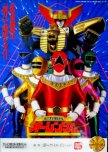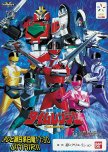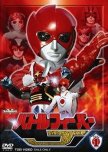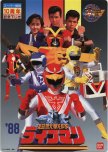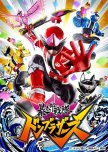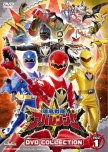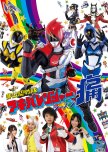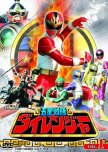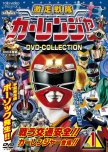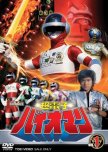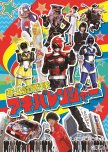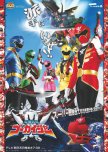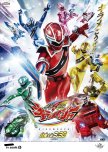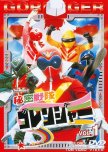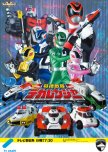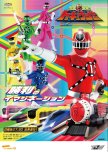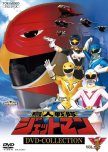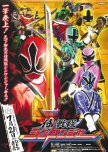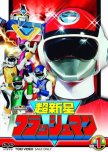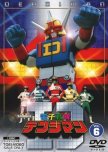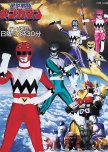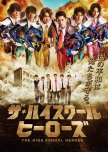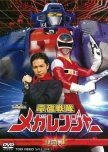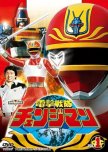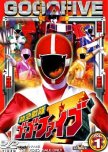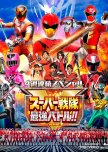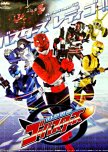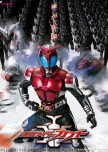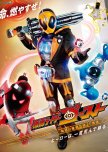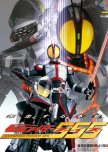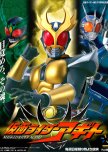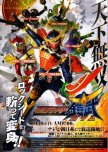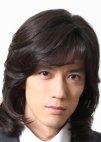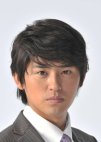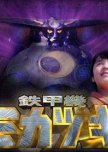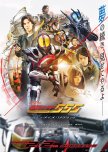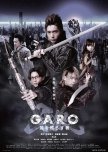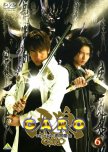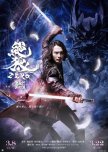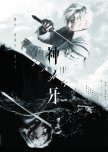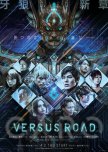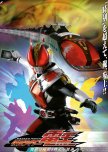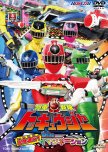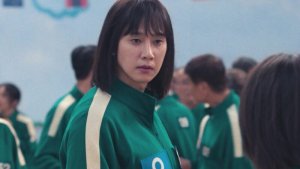Angel's Sentai Rankings
*spoiler warnings for Battle Fever J, ToQger, and Gingaman, mild spoilers for Donbrothers, Akibaranger*
Order Completed: Donbrothers, Jetman, Ohranger, Dairanger, ToQger, Timeranger, Battle Fever J, Gingaman, Abaranger, Changeman, Flashman, Megaranger, Liveman, Go-Busters, GoGoFive, Denziman, Dekaranger, Carranger, Shinkenger, Akibaranger S1, Gokaiger, Goranger, Akibaranger S2, Kiramager, Bioman, The High School Heroes
-
1. Chouriki Sentai Ohranger
Japanese Drama - 1995, 48 episodes
A rather unpopular series and a notably flawed production due to unfortunate tragedies in Japan at the time, but remarkable how it still succeeds so much in spite of its forced changes and nitpicks. The characters are less defined, the 6th Ranger is still awkwardly incorporated, the stakes and themes lose a bit of their precision over time, etc etc. However, what the production still manages to get away with in spite of that is still insanely good, from the direction, score, costumes and set design, editing, cinematography, organic villain escalation, diverse, distinct plot lines, tense tone and heavy subject matter, and its more Ultra-like team of competent, cooperative professionals, it feels like such a lovingly made, high grade production. There's just so much soul to this series that it is better than the sum of its parts and miraculous both because of how it pulls that off and for just being so primally awesome. Screw the haters, Ohranger is kino.
-
2. Mirai Sentai Timeranger
Japanese Drama - 2000, 51 episodes
Something of a counterpoint to Ohranger in certain respects: almost unanimously beloved, and easy to see why for how tightly constructed it is, it's an incredibly rigorous series. Every character gets a solid amount of dedicated focus episodes, they're all pretty likable, episodic content is pretty strong and bits of plot don't leave it feeling too static, the villains are very captivating, the production is really strong, etc. The time travel premise is naturally shaky though, and some of the connective tissue could feel more pronounced - the characters have good focus episodes, though their individual traits don't shine through terribly well in the surrounding areas, the plot's movement can sometimes be arbitrarily dictated rather than gradually motivated, etc, so at times it doesn't quite stick as organically as it could, but it's still very well done.
-
3. Battle Fever J
Japanese Drama - 1979, 52 episodes
Gets an edge with some of the push and pull with the villains that makes it feel less one-sided, the elaborate plots at times make for strong episodic offerings and the espionage element & professional intelligence of Battle Fever makes it exciting to watch their expertise out of battle and some of the organic developments with the overarching plot give it some momentum. Loses a bit of steam over time though, and the cast is wildly unbalanced. America 1 does fuck all, America 2 only gets bits in piecemeal, France can be a bit grating at times, Cossack 2 doesn't get too much for himself, enters rather late and doesn't fully feel like part of the team. The stronger members are Japan, Cossack 1 and Kenya, but Japan doesn't get too many focus episodes in the backhalf and dwindles a bit, Cossack 1 is quite good but gets phased out a bit before being replaced, and Kenya is a bit of a spotlight hog, as much as he is a great character. Lot of really great elements that could've been polished into something even better, but still strong.
-
4. Choujuu Sentai Liveman
Japanese Drama - 1988, 49 episodes
One of the better Soda Sentai I've seen. Stands out with its wistful, melancholic qualities, unifying themes on the value of life and its ecological bent, and the villains' struggles with reconciling their humanity and how far they will go to try and throw it away. Still has some Soda era hangups of too much episodic content feeling only tangentially relevant to the aesthetics and characters along with the focus episodes for characters and their individual traits not following a completely cohesive mold, but still refreshing and novel, but shy of greatness. Could've used a bit of a longer finale too maybe, but still good.
-
5. Avataro Sentai Donbrothers
Japanese Drama - 2022, 50 episodes
A really fun, near-great return to form for Inoue, Taro is such an exciting, provocative Red/Leader, especially amidst the sea of samey, overly cheery and infantile Reds of modern Sentai, lots of juicy Inoue drama and staples, unpredictable approach to its wider narrative (Inoue's pranks sometimes work to either its benefit or detriment), great hangout vibes, fun cast, just a very refreshingly unique series. Struggles with some of its unevenness as aforementioned - some of Inoue's anti-drama for the story developments can feel more disappointing than cheekily endearing, the Taro & Sonoi death duels get too repetitious, Tsuyoshi never gets explicitly called out/reprimanded for his murderous behaviour (as much as you can go through hoops to justify why his happy ending was acceptable), Inoue didn't know what to do with Saruhara much, the lack of more intimidating villains after the Noto begin softening can make it feel a bit aimless and lacking palpable consequences, and the other world lore is a lot less elaborate and fleshed out than it makes it out to be, so the final episodes feel less like a tense escalation than a bit of more of the same. Nevertheless, lots of great stuff to it, incredibly unique, if you go in taking it as more of a hangout series though, it will be less disappointing.
-
6. Bakuryuu Sentai Abaranger
Japanese Drama - 2003, 50 episodes
Inherent energy makes it highly watchable, the main trio are a distinct, lovable bunch, Mikoto's arc is rather strong and convincing, and there's some nice ideas about challenging destiny and cursed birthrights, but its hyperactive vibe can limit it as well as far as how it focuses its narrative. The supporting cast is novel conceptually, but can seem kind of limited in their interactions and personal lives to feel less like full characters, the major players don't have much in the way of greater arcs and recurring narrative threads than simply demonstrating their best character traits through interactions, Asuka is a bit of a weak(er) link with his melancholic fallen soldier thread & personality and a lot of silly one off, plot-centric episodes later dilute from more opportunities for proper focus episodes. What remains though is still a very solid, endearing good time, just doesn't go as far as it should.
-
7. Hikonin Sentai Akibaranger Season Tsuu
Japanese Drama - 2013, 13 episodes
Raunchier, steamier, and more confidently chaotic than S1, I think it's better with its humour, more inclusively relevant and clever about making fun of Sentai's tropes lovingly in a way that's more accessible and thorough than the first season. Feel like the resolution could be more thorough for the characters even if it plays into its increasingly convoluted nature and needle point twists with a knowing wink, but again, it does it with bravado that is easy to admire, especially with the darkly comic ending resolution completely out of left field, and then doubling down on it with the final recap episode as well to the very end, wild stuff. Doesn't break out into exceptional territory, but more great Akibaranger that is a must watch.
-
8. Gosei Sentai Dairanger
Japanese Drama - 1993, 50 episodes
First 15 or so episodes are pretty rough, and a lack of external, easily identifiable character traits is something Sugimura has trouble shaking a bit, even when the series picks up, but it says a LOT that it's as good as it is with over a quarter of it being pretty lacking. Once Kou is introduced (also one of the better characters, contrary to naysayers), the drama really gets some traction, all the isolated character arcs take better shape, the high tension tone gives it a very serious edge that provides it noteworthy presence, the lore is taken seriously and builds lasting intrigue, everything culminates to a very intense experience that explains how iconic of an entry it is. If it didn't have that early baggage, have more of the characters stand out independent of their arcs (barring maybe Shoji & Kou who do well for themselves), and maybe not make Kazu's arc so lame, it would be quite something.
-
9. Gekisou Sentai Carranger
Japanese Drama - 1996, 48 episodes
An official Sentai series riffing on the property with love, there's a lot of heart to this series that warms you to it. The comedy is pretty amusing, and when it wants to get serious, it delivers some captivating drama and tension that really soars, even if the transition between these modes isn't always the most graceful. Has some odds and ends that unfortunately hold it back from greatness: some major actors that leave halfway through the series and make kind of a weird narrative hole in the premise, other big characters like Signalman and VRV Master as great as they are, pushed to the side for pretty long periods, missed opportunities to capitalize on some bigger recurring gags like the Imoyokan stuff, some subplots like a major romance thread coming and going in spurts, and a lack of more consistent focus episodes. Despite this, it's a very novel series easy to recommend as a standout and with which its best qualities make it really worth seeing despite the uneven package. Kyosuke is also a really great Red for his conviction making up for his inexperience and shortcomings. Good stuff.
-
10. Super Elétron Bioman
Japanese Drama - 1984, 51 episodes
Interesting series with a refreshing approach to villain hierarchies and episode structure that feels a bit more unique. Has a recurrent motif of humanity vs inhumanity in technology and how that intermingles, with a bit more cohesion than some other Soda series, but still could use a bit more oomph in its storytelling to put it over the edge. The heroes are your standard Soda hereos that are competent but not terribly descript, villains have some paradigms and back and forth with each other, and Doctor Man is conceptually interesting as a mastermind while Monster and Zyuo/Juo are fun henchman on the lighter side, the others a bit less pronounced but functional. Silva is a great wild card, but still a bit let down by the series overall lack of exceptional polish, but his theme, cold personality, design, and general aura and power are nonetheless remarkable. Truthfully this feels like a test run for a lot of things Liveman would go on to do better, but there's a lot of worthwhile qualities to this that make it worth a look.
-
11. Hikonin Sentai Akibaranger
Japanese Drama - 2012, 13 episodes
Fun Sentai otaku homage with a bunch of gags about series conventions and nerdy references galore. Sometimes feels like the humour is just in how absurdly deep cut the references are in themselves, so it can feel a bit passive at times, and the middle kind of meanders a bit with its plot, but the last stretch with the true meta element to add layers on top of the delusion stuff and how it plays with those bits is quite endearing, even the recap finale is given a new context in a novel way. A bit uneven, but a good time.
-
12. Kaizoku Sentai Goukaiger
Japanese Drama - 2011, 51 episodes
Team is refreshing with some of their bits of grey morality while remaining generally pretty distinct and likable. Tribute episodes can feel kind of tangential and asinine more often than having something really meaningful, but there's some like Jetman, Liveman, Ohranger, Dairanger and maybe Go-Onger and Timeranger's were pretty good, others could feel quite lacking. Works in spite of itself though considering there's more misses than hits, but would've liked some richer focus episodes in higher quantity, especially for Ahim. Quite fun.
-
13. Mashin Sentai Kiramager
Japanese Drama - 2020, 45 episodes
Feels like a slightly improved ToQger tonally with a more balanced use of its cast and better use of its villains in a way. Limited by a similar safeness, but mostly a strong sort of likable characters and an endgame that meaningfully uses its gradual plot developments and lots of small details to a good cumulative effect, just wish there were more plot-oriented episodes peppered throughout than the litany of silly one-offs that handicap its staying power a bit. As is, solid, but lacks an edge to push it further.
-
14. Gorenger
Japanese Drama - 1975, 84 episodes
VERY long, so it definitely wears out its welcome and is rather slack with characterization, but more acceptable given its age. There's formula changeups that tend to be for the worse barring maybe the set change from the bland curry shop to the more vibrant and detailed fruit parlor base, but it stops being shown much rather early. The earnest commitment to trying something kind of fresh and new for the time with this particular formula gives the series a true weekend morning cartoon charm that's easy to click with, would be fun to watch an episode or two again casually on a whim, very fitting for that style, but otherwise would not recommend binging too much at a time.
-
15. Tokusou Sentai Dekaranger
Japanese Drama - 2004, 50 episodes
A bit of an odd one - initial premise and some of the character motivations highlight an interweaving, complementary team dynamic, and similarly, it defers the usual "Red as Leader" function of traditional Sentai to level the team evenly, but between that and its unconventional episode structure, it never really goes deep enough with these novelties to something more meaningful and ambitious. The characters are all competent and likable enough, but like with Abaranger, the core players don't have much for backstories and angst that helps the viewers intimately understand the behaviours that shape them quite as much, and Abaranger had a plucky cast with more distinct basic character traits to pair alongside that - Dekaranger's heroes feel a bit more interchangeable meanwhile, and their external traits not entirely having a bearing on connecting with the one-off characters as meaningfully as they could.
It's a novel, good looking production, and does some things a lot differently from other Sentai that make it worthwhile to recommend, but feels a bit too distant to reach real greatness.
-
16. Ressha Sentai ToQger
Japanese Drama - 2014, 47 episodes
Right is a strong Red/Leader who has some of the childlike qualities of a lot of modern Reds (also narratively justified), but with an added forthright, eager, and stubborn quality that makes him very fun, and the rest of the Rangers all equally have star-power good looks and lovable personalities, it's a very good bunch. The genki energy makes it very watchable in its tonal conduction and succeeds in spite of how childish a lot of plots tend to be. Indeed, there's a very patronizing, restrained approach Kobayashi takes here, perhaps required for modern Sentai to an extent, but a bit disappointing to see. A lot of the villains are forgettable and pathetic, but especially how goofy the MOTW baddies are, and for all the grey areas and vulnerability Kobayashi gives Z as an almost reluctant villain, the fact that he still is beholden to being an out and out villain so begrudgingly and not getting a redemption arc instead to be replaced with a more malicious villain is incredibly disappointing, and his motivations are very abstract and asinine really. Even still, the raw charm of the cast and the show's own tone carry it a long way surprisingly.
-
17. Chojin Sentai Jetman
Japanese Drama - 1991, 51 episodes
Frankly didn't get too much out of it despite it being one of the most storied entries and a rare Inoue-headed Sentai series after writing sporadically for other series with different main writers. Gai Yuki is cool as a proto-Kusaka and generally fitting the Inoue contrarian ally mold, though he's still only a template for even better characters he would do later, but still solid. His love triangle and all the melodrama between him, Ryu and Kaori are the main highlight of the series, but otherwise the rest of it feels a bit standard but fun enough. Ako and Raita don't get all that much for focus episodes and always feel subservient to the Ryu-Gai-Kaori drama, the episodics are kinda fun but nothing too exemplary most times, and he repeats the disposable newcomer team plots a few times which gets old. Even Ryu himself can sometimes be a bit lacking as an individual outside of his relationship drama, but he's still adequate. The villain shakeups can be refreshing but still a little safe, nothing too crazy. Overall, has a few nuggets that are novel, and doesn't do much that's bad, but not quite filling enough, begrudgingly must say I think it's overhyped, but still "good" Inoue content.
-
18. Samurai Sentai Shinkenger
Japanese Drama - 2009, 49 episodes
Another entry that didn't live up to its potential, but still is salvageable. Kobayashi promises more thorough arcs and hearty angst than she is properly able to deliver on with large swathes of one-off, tangential episodic fare with less focus episodes that properly dig deep for the cast. Even on the villain's side, their histories are kind of fragmented and abstract rather than fully explored to soak in the pathos. Most of the heroes are decent but lack real presence because of this (the "samurai training" is never really divulged and doesn't have as much sorrowful effect on the cast that it could), and don't have the best consistent external characterization. Genta fares the best as a standout with his affable energy, commitment to self-improvement and compassion among other things, a genuinely good character. The villains again, have kind of interesting backstories but not fleshed out thoroughly enough, leaving more unfavourable comparisons to Timeranger's dynamics. The series not budgeting its time well and focusing its efforts on the more interesting plot more result in a similarly truncated endgame where a big revelation creates a new character that mostly feels like a plot device and a bit reductive, the villains' ends feeling anticlimactic, and the characters' personal goals feeling like a footnote, not helped by Takeru's muted presence which uses a lot of this last minute narrative development to justify his lack of charisma and nuance really. What could've been quite riveting and layered felt a bit more unplanned and phoned in at times, but ultimately still has some charm to get by.
-
19. Comando Estelar Flashman
Japanese Drama - 1986, 50 episodes
Immediately following my Changeman watch, Flashman had some neat aesthetics and an intriguing premise at first, but comparatively didn't have strong hooks starting out. It's more even-handed than Changeman, and the characters generally get focus episodes here and there, but it's still rather precipitous and harder to place. A lot of it felt pretty indistinct and kind of formulaic and tepid, just functional enough like Gingaman, but as Gingaman suffered similarly to Changeman in lack of potential, Flashman remains almost wholly at the same modest key, so it rarely disappoints, but never really had much promise either. Watchable enough, but yeah nothing special, unlikely to revisit.
-
20. Denziman
Japanese Drama - 1980, 51 episodes
What I thought would be the polished version of Battle Fever J's untapped potential and Uehara's crown jewel for Sentai as I was lead to believe wound up to be a big step down from BFJ instead. I guess for others it crystallized the Sentai formula in some ways, but as a result, it feels overly traditional and doesn't do much novel to stand out. Cast is more level, but doesn't have the highs of Cossack 1 and Battle Kenya, while Akagi is more boring than Masao as a Red, who at least had some solid focus episodes as few as they were. Akira is a solid Pink in her later episodes, and the other guys are again, pretty good but has no real standouts. Doesn't do much to changeup the narrative long term, feels especially more bloated and patched together, but some of the more inherent lived-in episodic quality from Uehara era Sentai gives it enough charm, but yeah, also just functional enough but lacks a more daring edge.
-
21. Seijuu Sentai Gingaman
Japanese Drama - 1998, 50 episodes
Having watched Timeranger prior to Gingaman made watching the latter more frustrating, as nearly everything Gingaman tries to do, Timeranger simply does much better. Even on its own terms, it just feels way too plain and traditional, the equivalent of what Kobayashi did for OOO: gets the job done, functional enough without feeling "disappointing" outright, but never really satisfying either. Initial premise is kind of cliched passing of the torch stuff, Ryoma is an OK but indistinct lead, and the other cast members mostly have some nice qualities when they are highlighted but slide off quickly, with Gouki standing out for his romantic subplot. The Black Knight arc began with promise, but Hyuga's extremely awkward re-incorporation into the heroes' side after the halfway point makes it feel like an almost needless decision to have a 6th ranger for this particular entry. There's a quaint charm to Gingaman that keeps it afloat, but interest really wanes with it over time.
-
22. Os Heróis do Ensino Médio
Japanese Drama - 2021, 8 episodes
Yuya Takahashi tries his hand at Sentai for the first time, and in an unorthodox format to mixed results. Trying to fill in a 6 man Sentai team in 8 double length episodes on top of all the stuff with the side characters and everything is already a bit of a fool's errand and the results show a bit despite some admirable qualities here and there. Half the cast become kind of peripheral to the general team dynamic outside of their focus episodes where it doesn't feel like their traits shine through in the drama that moves beyond them. Oura's backstory is kind of overly convoluted and misshapen, pushed too far to the end, and the principal's daughter becomes a forgotten thread almost as soon as she's introduced despite teasing more relevance for her. The themes don't fully coalesce materially with a lot of the drama to build it up and mostly wind up a lot of platitudes and trite generalizations. The memory altering stuff is too desperate of a plot device in the last stretch even used for a retcon which still leaves a thread dangling. Then the whole mystery component doesn't really work because it tends to have the culprit come forward before the characters and the audience can really process all the clues. Even still, its more dramatic tone that's more Rider (Fourze) like is a nice changeup from the usual stuff and a lot of it registers in spite of itself and its sometimes histrionic drama. Plus, has some trans representation as kinda rudimentary as it is, but that's still something!
-
23. Denji Sentai Megaranger
Japanese Drama - 1997, 51 episodes
Aesthetically very dorky and not my thing, writing feels pretty broad, villains very whatever, pretty unremarkable in most respects, but there's a watchable, youthful charm and energy to it that makes it bearable, but on a granular level, nothing to write home about.
-
24. Esquadrão Relâmpago Changeman
Japanese Drama - 1985, 55 episodes
Starts somewhat interestingly with a hardcore military aesthetic and soldier hero premise, with some bombast that makes it fairly watchable, but over time, loses considerable steam more than other Sentai I've seen. The heroes have only a few episodes each that can vaguely be considered "focus episodes" and are mostly hard to place and remember, the villain roster is overused with too many of them on the frontlines for too long that they begin to grate, and their individual arcs/defining threads mostly shoved all together for the endgame where they still feel clashing and subservient to the greater urgency of the approaching final battle. Every time it teases the start of a villain's thread and some major developments, it immediately shoves it back in the corner to hibernate for dozens of episodes (basically until the end for each one) which makes the bulk of the series feel stuffed with one-off plots of diminishing presence and worth as opposed to using all its time for something more meaningful and organic with its cast. An approximation of a decent show in there that salvages it, but mostly a lot of disappointing noise, kind of hollow.
-
25. Kyuukyuu Sentai GoGoFive
Japanese Drama - 1999, 50 episodes
Very drab, minimalist aesthetic, a rather unlikable Red who is too pigheaded and doesn't get much comeuppance for his snarky behaviour, even if he's vindicated in doing the right thing a lot of the time, and generally the writing doesn't do much to impress. Okay focus episodes here and there but a bit nonspecific, some stretches and episodes with high tension and major setbacks with some push and pull, but concentrates it too much in the middle, while the last quarter seems more tangential and doesn't build on the early developments as tightly as before. Very whatever.
-
26. 4 Week Continuous Special Super Sentai Strongest Battle!!
Japanese Special - 2019, 4 episodes
Weird assemblage of heroes it doesn't really know who to focus on, Arakawa writes Marvelous to be more of an impatient jackass than he typically is, the plotting is very scattershot, premise seems very flimsy and half-sketched, mystery is generally obvious, handling of tone and basic continuity in editing between shots or beats is pretty jarring, barely has a resolution, just feels incredibly jank and slapped together. No idea why this is as beloved as it is.
-
27. Esquadrão de Operações Especiais Go-Busters
Japanese Drama - 2012, 50 episodes
Really dull. Starts off with a po-faced, serious business tonality, but doesn't have the writing chops to delve into some elaborate, sophisticated Sentai entry and instead just winds up very formulaic and hollow. Attempts at some darker character drama is mostly just outright dropped after starting out with some insidious foundation, not even having the courage to meaningfully engage with it, and subsequently, half the cast is unlikable and/or uninteresting because of it. Masato & J have some fun chemistry, vigor and a novel dynamic to breathe a little light into it, but are still secondary to the main 3, and Escape has her sadistic streak and more personal motivations on top of the Messiah stuff that make her endearing (on top of Ayame Misaki being hot and naturally charismatic) but she too, is secondary to Enter, the more one-note villain, and her character devolves a bit too much into Enter/Messiah kowtowing. Ryuji's berserker side has a bit of intrigue but doesn't go anywhere too meaningful, but he's the next best following Masato, J and Escape; Yoko starts out whiny and naive and then they just remove her whininess a bit at some point without much of a proper arc, and similarly, Hiromu starts out as an overly critical jackass just with moments of camaraderie and compassion which also just has his worst habits removed at some random point without properly interrogating them. All the fake-out ending arcs and how it continually elongates itself on top of all the meaningless MOTW fare with little sense of progression make it a pretty tiring watch. Really just saved by those 3 kinda decent characters.


